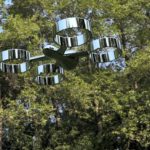From reducing congestion to changing the way we receive deliveries, UAM will have a far reaching impact on the urban landscape, according to Deloitte
Urban air mobility will affect the shape of our cities as well as the vehicles we travel in, according to Deloitte.
Jim Cranswick, Director of Aviation at Deloitte, said the emerging technology could result in real gains for cities – but cautioned that the benefits would need to cascade down to all sections of the population for the new technologies to encourage their adoption.
He said: “We look at it as the future of mobility and how do we reduce everyday pressures such as reducing congestion in our cities, giving our city spaces back to the people that work there. Urban air mobility will help deliver some of that beneficial gain through being able to move people in a quicker and more efficient manner.”
“There are some challenges in that market going forward. We need to ensure that it’s not seen as just for the few, that allows them to get to places quicker, and that it actually has societal benefit in everything that it does.”
Cities that are a better place for everyone to live
“And it needs to be looked at in terms of how we remove cargo from the streets, delivery vans, all those other aspects, so that we can create cities that are a better place for everyone to live.”
Cranswick said the costs would be high but there was a clear understanding of the cost basis of UAM from certification paths but there would be other aspects which would need evaluation.
“How do we reshape what the city looks like? When you are talking about infrastructure planning, what does that roof space look like? Does your post go to the roof, rather than the floor and how does that work?”
Cranswick, who has a background as an air traffic controller said there would also be a need for a independent body to oversee regulations.
“From the unmanned space, we have seen challenges recently around software and software development and there’s always this balance between the speed of technology, regulatory standards being set and the capabilities they have.”
Need for a third party regulatory body
“One of the things we see going forward is that there’s probably a need for an independent third party to be able to say, ‘You have created the regulations and these are the standards that need to be met to make sure its operated safely’ and that’s not for Deloitte to determine.”
Cranswick said this would be particularly important as UAM developed towards autonomous vehicles where machines and AI were starting to make safety critical decisions.

